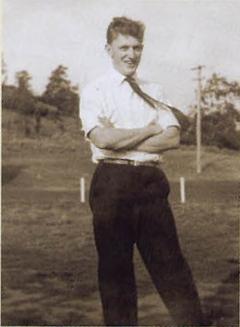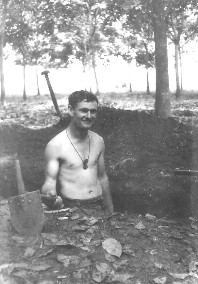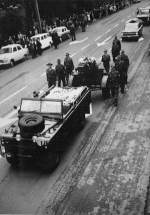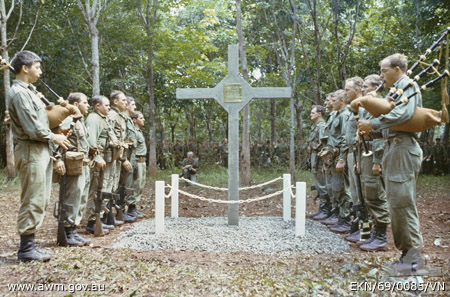Coincidence and Fate on a Battlefield called Long Tan
By Tim McCormack
“What an extraordinary coincidence that two young McCormack’s, unrelated and from different states, ended up dying next to each other on a battlefield in Vietnam.”

A knock at the door….the fateful telegram….and then the 20th August 1966 headlines in that evening’s edition of the Examiner Express – ‘Launceston Boy Killed in Viet. Battle’ – thrust the Vietnam War into the face of every Tasmanian. Albert Frederick McCormack was Effie and George McCormack’s youngest and Tasmania’s first son to die in the conflict that hardly seemed real in the distant ‘Apple Isle’…until Long Tan.
Albert’s life began and ended in war. He was born on 20 March 1945 before World War II had ended in either Europe or the Pacific. Twenty-one years later his life was cut short in the hail of bullets that has come to represent the defining Australian battle of the Vietnam War – in a rubber plantation on the outskirts of the hamlet of Long Tan.
My Cousin Albert’s funeral is one of my most vivid childhood memories. Although I was just six years old at the time, the images are indelibly etched: uniformed soldiers with medals and brass crowding the small Elizabeth Street Gospel Hall; the coffin draped in the Australian flag accompanied by marching soldiers all the way to Carr Villa Cemetery; young soldiers firing a salute before the coffin was lowered. I remember innocently running to collect the empty cartridges only to have two unexploded blanks confiscated by an astute uncle. I revisited Carr Villa Cemetery a few years ago and found Albert’s grave next to that of his parents, and also, movingly for me, exactly as I had remembered it three-and-a-half decades earlier.
Albert was the youngest of seven children and grew up in Ormley Street, Launceston. He studied at Launceston High School and after working for three years with the Tasmanian Government Insurance Office, moved to Brisbane in 1964 to work for an insurance firm there. Just three months after his twentieth birthday, Albert was conscripted into the newly established 6th Battalion of the Royal Australia Regiment (6RAR), raised specifically for Vietnam and composed almost entirely of conscripts among the non-commissioned ranks. After 12 months of training he was deployed with the battalion in June 1966.
Albert’s mates from D Company, especially those he fought with in 11 Platoon, describe a sensitive, articulate and musically talented bloke who was most content playing his guitar with the band he helped to form. All the Diggers from D Company knew him as Lionel McCormack. Apparently he reminded some lark of the singer Lionel Long and his nickname has stuck for 40 years. He was the designated stretcher-bearer for 11 Platoon and had primary responsibility for administering medical aid.
Albert’s last letter was written to his parents the day before he was killed. He described the Viet Cong mortaring the Australian base at Nui Dat in the early hours of 17 August 1966 and how the B Company patrol had located the mortar base plates but had not encountered the Viet Cong soldiers responsible. Instead, it was Albert and the other 107 Diggers of D Company, sent out on just another routine patrol from Nui Dat in the early afternoon of 18 August 1966, who encountered as many as 2500 Viet Cong massing in the Long Tan rubber plantation for a serious assault on the Australian force.
How dreadful the ensuing fire fight must have been as literally thousands of bullets exploded out of automatic weapons, destroying the rubber plantation and the lives of many of the young men crowded in it, producing pungent, acrid, cordite smoke and streaks of tracer fire. Simultaneously, thousands of shells fired from the heavy artillery at Nui Dat smashed into the ground, blasting shrapnel and body parts throughout the plantation. The heavy skies opened and a torrential monsoon seemed only to add to the inferno rather than douse it.

The Diggers of 11 Platoon were the first to engage. In the lead section of the platoon another McCormack was an early casualty. Private Dennis McCormack had also been conscripted into 11 Platoon, D Company, 6RAR with the next consecutive service number (assigned on the basis of surname in alphabetical order) to my cousin Albert’s. When the names of the 18 Diggers killed at Long Tan are read out at memorial services people often wonder whether two brothers were killed that day. Dennis was from Adelaide and no immediate relative of Albert but when he was shot, Albert went to him and was himself fatally wounded in the stomach as he attempted to administer first aid. What an extraordinary coincidence that two young McCormack’s, unrelated and from different states, ended up dying next to each other on a battlefield in Vietnam.
The immortal words of The Ode are as true for Albert as for all other lives cut short prematurely: “They will not grow old as we that remain grow old. Age shall not weary them.” My cousin is forever a fit, strong and youthful 21 year old. I was so young when he died and I had so much growing up to do. Now I am more than twice his age and past my physical prime. His mates are in their 60’s and in just a few more decades none will remain.

Of course I would rather have him alive and be able to talk to him about his memories if he were happy to share them. But he at least did not suffer the ignominy of utterly unjustified and shameful vilification upon his return from a controversial war. No one spat at him or verbally abused him, as was the experience of so many returning Vietnam veterans. His death occurred before the anti-war movement had gathered momentum and the people of Launceston turned out to honour him. He is immortalised on the honour roll of the 6th Battalion and in the hearts of his immediate and extended family.
He did not ask to go to war and did not relish his participation in it. He inscribed the motto of the anti-war movement ‘Save our Sons’ on his army hat and wrote home about his personal struggles with the horrors he witnessed in the conflict. Irrespective of the merits of the war, he went to Vietnam because his country asked it of him. In paying the supreme sacrifice, he was true to the 6th Battalion motto – Duty First.

On the third anniversary of the Battle of Long Tan, 6RAR was back at Nui Dat on the battalion’s second tour of duty. D company, which included veterans of the battle, erected a memorial cross in a clearing next to the rubber plantation in honour of their fallen comrades. The Long Tan Cross has now become symbolic of the loss of Australian lives at Long Tan and of the cost of the nation’s participation in the conflict. One of the Diggers who helped erect the cross told me that, as the chopper lowered the cross into the clearing, the heavy monsoonal clouds parted and a shaft of sunlight lit up the cross and followed it throughout its descent. He was visibly moved as he recalled the spectacle he witnessed so many years ago. Long Tan, for us, and for many other Australians, is hallowed ground.
